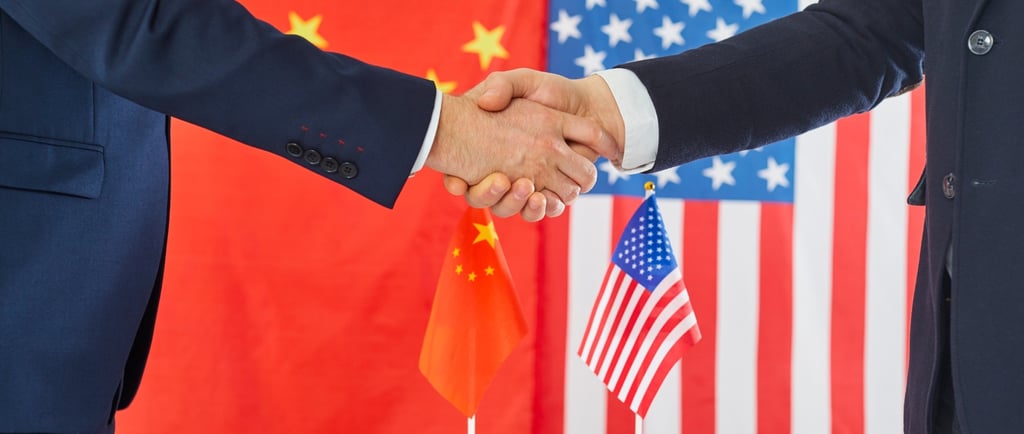BND Scope: May – Issue 2 – U.S. Economy: Between Tariffs, Transitions, and Tensions
Amid tariffs and transitions, opportunity emerges: The U.S. economy is entering a phase shaped by trade breakthroughs, tax reform proposals, and sector-wide transformations. In this issue, we explore what’s moving the markets—from Warren Buffett’s final word as CEO to real estate shifts and optimistic signals from Latin America. For investors and global entrepreneurs, this moment could be the opening they’ve been waiting for.
BND SCOPE
5/17/20255 min read


Welcome to the second May edition of BND Scope, your bi-weekly digest of key U.S. economic developments. This issue covers fresh shifts in trade policy, structural transformations in the real estate and pharmaceutical sectors, and renewed uncertainties in consumer confidence. At BND Consulting, we believe staying informed is the first step to identifying opportunities in uncertain times. Let’s explore what’s happening across the economic landscape this week.
President Trump’s newly proposed elimination of income taxes for earners under $200,000 has sparked both excitement and concern. While it may increase consumer purchasing power, experts warn it could worsen the U.S. fiscal deficit—already at $1.83 trillion—and increase reliance on tariffs as a replacement for tax revenue.
“The math just doesn't add up,” says Erica York of the Tax Foundation.
At the same time, first-quarter GDP contracted by 0.3%, largely due to a surge in imports ahead of tariff hikes. A second consecutive contraction would trigger a technical recession, and investors are watching closely.
Still, there’s cautious optimism. The Atlanta Fed forecasts 1.1% real GDP growth for Q2, but much depends on how businesses and consumers respond to policy volatility.
According to Grand View Research, the U.S. real estate market is projected to reach $172.13 billion by 2030, growing at a steady CAGR of 4.1%.
Key takeaways:
Urbanization and population growth are driving demand.
Multifamily housing is outperforming due to strong fundamentals.
Declining property values (down 20% since 2022) and rising cap rates are shifting investor focus.
Rental models and multi-generational housing are redefining consumer preferences.
Despite this, homeownership remains elusive for many. Gallup reports that only 30% of non-homeowners expect to buy a home within 5 years, with affordability as the biggest barrier.
Trump’s Economic Vision: Deregulation, Trade Deals, and “America First”
A Divided Outlook: Growth Weakens as Tariffs Intensify
Treasury Secretary Scott Bessent detailed Trump’s economic roadmap at the Milken Institute Conference: tax cuts, deregulation, and aggressive tariffs are the pillars. According to Bessent, these policies aim to make the U.S. “more appealing for investors like you.”
Meanwhile, President Trump reassured markets that Federal Reserve Chair Jerome Powell will not be removed, despite public criticism. Trump maintains that the “strong” parts of the economy are his doing, while blaming former President Biden for recent GDP contraction.
Investment Icons Speak: Warren Buffett’s Final Word as CEO
At Berkshire Hathaway’s 60th annual meeting, Warren Buffett announced Greg Abel will take over as CEO by year-end. In his characteristically candid remarks, Buffett shared reflections on the U.S. economy and where he sees true opportunity:
“We're running a business which is very, very, very opportunistic,” he said. “We came pretty close to spending $10 billion not that long ago. We'd spend $100 billion.”
He made clear that while the real estate market is increasingly constrained by complex ownership structures and demographic headwinds, securities markets offer more fluid opportunities:
“In the United States, there's so much more opportunity that presents itself in the security market than in real estate.”
Buffett also commented on currency dynamics, suggesting that global shifts could warrant diversifying away from the U.S. dollar in specific cases:
“We wouldn't want to be owning anything in a currency that was really going to hell… There might be a situation where we would do a lot of financing in their currency.”
Finally, despite U.S. fiscal risks and bureaucratic bloat, Buffett’s belief in America’s long-term promise remains unshaken:
“Capitalism in the United States has succeeded like nothing you’ve ever seen… We’ve gone through great recessions, world wars, and still come out ahead. I would not get discouraged.”
Watch the announcement of Buffet about stepping down from the CEO position of Berkshire:

Real Estate Snapshot: Shifting Fundamentals and Long-Term Potential
President Trump’s push to repatriate drug manufacturing has resulted in over $300 billion in investment announcements from industry giants such as:
Johnson & Johnson – $55B
Roche – $50B
Bristol Myers Squibb – $40B
Eli Lilly – $27B
Merck – $9B
The return of pharmaceutical production is being framed as both an economic and national security imperative, with long-term implications for job creation and R&D capacity.


A Pharmaceutical Resurgence: Domestic Manufacturing on the Rise
From tax reform proposals and a resurgence in biotech investment to the evolving landscape of real estate, the American economy stands at a pivotal crossroads. But perhaps the most consequential development of the past two weeks has been the trade agreement between the United States and China.
By easing tariffs and opening a structured path for future cooperation, the deal has not only reduced short-term volatility but also reinvigorated long-term confidence across key sectors—from manufacturing to exports, and from supply chain logistics to capital markets.
For strategic investors and global-minded entrepreneurs, this is a window of opportunity. Those who can read the macro shifts and act decisively stand to benefit from an economy that—while uncertain—is rich with possibility.

At BND Consulting, we help you do exactly that: decode complexity, identify trends, and design smart strategies to turn change into momentum. We’d greatly appreciate your support by following us on our social media accounts.
Fed on Hold, Markets on Edge
The Federal Reserve has held interest rates steady at 4.25–4.5%, signaling uncertainty over how tariffs will affect inflation and unemployment. Chair Powell and Governor Barr both acknowledged the risk of entering a period of persistent supply shocks and stagflation.
Markets are reacting with volatility:
Nasdaq flat, Dow and S&P slightly down
Tech stocks mixed
Bitcoin above $100,000
Oil rebounding to $61.05
Powell stressed the Fed is adopting a wait-and-see approach, with flexibility to cut or raise rates depending on how the economic data evolves.
Global Signals: From Tariff Tensions to Trade Triumphs
In a dramatic shift from just two weeks ago, what began as escalating tariff rhetoric has turned into a historic breakthrough in U.S.-China trade relations. On May 12, the United States and China issued a rare joint statement confirming a major agreement reached in Geneva.
The Deal at a Glance
Tariff rollback: Both countries will reduce tariffs by 115%, replacing them with a unified 10% baseline tariff—a strategic floor meant to support domestic industry without igniting further trade wars.
Retaliatory measures lifted: China will suspend its 34% retaliatory tariff and other non-tariff countermeasures.
90-day stabilization window: The U.S. and China agreed to pause harsher tariffs imposed in early April, allowing breathing room for deeper structural talks.
Commitment to long-term dialogue: A bilateral mechanism is being established to manage future economic engagement and tackle broader issues like market access and supply chain integrity.
Fentanyl cooperation: Both nations pledged joint enforcement to curb fentanyl precursor flows from China to North America.
This development comes just days after a separate U.K. deal, reinforcing the administration's multi-front push to realign global trade dynamics. Markets that had been bracing for prolonged confrontation now see a path forward toward rebalancing.
“This trade deal is a win for the United States,” the White House stated, calling it a strategic victory that protects American workers and unlocks new potential for U.S. exporters.
Is it a win or what for United States?
Expectations Recalibrated
The tone in financial markets has improved notably:
Investor sentiment stabilized after weeks of uncertainty.
Risk of stagflation eased, with some inflation pressure expected to recede if tariffs stay moderated.
Supply chain forecasts have been adjusted to reflect less disruption, especially in the tech and industrial sectors.
While it’s too early to declare lasting peace, this agreement halts the economic bleed and replaces it with structured, results-driven diplomacy—something that investors and businesses had been hoping for.
Meanwhile, in Latin America...
The region continues to shine as the world’s fastest-growing insurance market, with 11% CAGR in gross written premiums (GWP) from 2019 to 2024. Structural inefficiencies in distribution are now being tackled head-on:
Digital transformation is accelerating, particularly in hybrid and embedded insurance models.
Affinity partnerships with banks and telcos are growing stronger.
Consumer demand for personalized and seamless journeys is pushing the industry toward innovation.
Amid global volatility, Latin America’s insurance evolution represents a different kind of growth story—one fueled by technology, demographics, and modernization, not geopolitical tension.
Final Thoughts
Consulting
Join
info@bnd.consulting
+1 (832) 270-5239
© 2024. All rights reserved.

800 Bonaventure Way Ste 116 Sugar Land TX 77479
